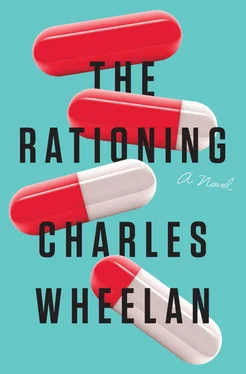“Dormigen is no different than Band-Aids or aspirin,” the Acting Secretary answered. “It’s expensive, yes, but it’s plentiful. When the supply is running low, you order more. And when you order more, it comes. No one has ever considered anything different.”
The Chief of Staff steered us back on track. “Why don’t you tell us what you have in mind?” she said to the Acting Secretary.
The Acting Secretary stood and buttoned his suit jacket over his sizable stomach. It was a gesture of formality that I found oddly affecting, as it seemed to signal some kind respect for the moment. “Mr. President, members of the Cabinet Working Group, thank you for this opportunity to present my ideas. I’m particularly appreciative since, as you all know, I’m merely a placeholder in this position.” These opening remarks were not as stilted as they may now seem. Like the small gesture of buttoning his suit jacket, the formality of the Acting Secretary’s remarks gave a certain gravitas to the moment, which was all the more noteworthy because of his normal levity. The Acting HHS Secretary had been the person least in awe of the President throughout this process, yet here he was showing the most deference to our situation when it came his turn to make a recommendation. “I don’t have a fancy presentation,” he continued.
“Good,” said the President. “Just tell us what you want to tell us.”
The Acting Secretary nodded respectfully. He looked around the table slowly, almost as if to generate suspense. “My idea is very simple, though don’t for a second think I haven’t given it a great deal of thought. I propose that the available doses of Dormigen be allocated to those who need it based on a lottery. Everyone with a Social Security number is eligible. We will draw numbers—electronically, I assume—and the persons with the Social Security numbers selected will receive the available doses.”
“People are going to live or die based on a lottery?” the Speaker asked scornfully.
“My dad went to Vietnam because of a lottery,” the Acting Secretary said, not missing a beat. He had obviously anticipated that question.
There was silence around the table, and not even much movement, as if the cabinet had been frozen in place, or was posing for one of those old-fashioned photos that required stillness for twenty seconds. The Majority Leader spoke first. “A lottery? That doesn’t feel right.”
“Which one: for Vietnam or for Dormigen?” the Acting Secretary asked pointedly.
“Hold on a second,” the Strategist interjected. “Why don’t we just sell the stuff? Supply and demand. That’s what we do when we have a shortage of anything else.”
“You can’t be serious,” the House Speaker said.
“Why can’t I be serious?” the Strategist said. I could not tell if he was being literal, or if he was just trying to provoke her.
“You propose that we give a lifesaving drug only to those who can afford it?” she said, genuinely incredulous.
“Hello! Welcome to America!” the Strategist said loudly, almost yelling but not quite. “That’s what we’ve been doing with health care for the last eighty years.”
“It’s not the same thing,” the Speaker said.
“Really? I passed at least four homeless guys on my way here this morning. Do you think those guys are sleeping on the street because they have a special affinity for the outdoors?” The Strategist was more visibly emotional than I had seen him. I could not tell if he was angry because of the social injustice of the situation, or because the Speaker refused to accept his logic.
“They’re mentally ill,” she said. “They have substance abuse problems.”
“Then why don’t they get treatment? Because it would conflict with their regular golf game?”
The Speaker paused, taking a breath to calm herself before she responded. “I have supported higher funding for those programs at every turn. I sponsored many of those bills.”
“Did they pass?” the Strategist asked.
“Ask the President about that,” the Speaker replied tartly.
“Did they pass?” the Strategist repeated.
“Usually not,” the Speaker answered. “I don’t understand where you’re going with this.”
Because the room was so quiet and still, we all noticed as the President shifted in his seat and took off his reading glasses. He stared at the Strategist with an expression I had not seen; his whole bearing seemed to soften, as if the White House porters had whisked away the anger and frustration of the past week along with the coffee cups and dirty plates. “John, I appreciate what you’re saying,” the President said. He rarely called staffers by their first names, so I noticed when he did. “You’re right. You are absolutely right.”
“Don’t patronize me,” the Strategist warned.
“I’m not patronizing you,” the President said. “God knows I’ve learned that lesson.” There was some chuckling around the table. Even the Strategist smiled slightly. The President continued, “There is no doubt that we have a system in which…” He paused to gather his thoughts. “Life is not fair.”
“Life is not fair anywhere, Mr. President, but it is uniquely American to deprive poor people of basic necessities that we as a society could easily afford to provide for them.” The Strategist was calmer now, having had a chance to express his thoughts. The President nodded in acknowledgment but said nothing. I could not for the life of me figure out what was happening. The Strategist was no flaming leftie; if anything, he had been the most caustic critic of some of the Speaker’s proposals. He described the $22 minimum wage proposal as “a policy designed by a kindergarten student who had been hit on the head during block-building hour.” That was his exact comment. For obvious reasons, journalists loved interviewing the Strategist, and for equally obvious reasons, the White House tried to make sure it happened as infrequently as possible.
I looked at the Chief of Staff, but her expression betrayed nothing.
Finally, the President spoke again, “John, how is auctioning off Dormigen going to make any of that any better?”
“It would hold a mirror up to society,” he answered. “It would say, ‘This is what we have become. We are the richest society in the history of civilization, but if you can’t afford the basic necessities of life, you’re fucked.’” The Strategist was emotionally taut. He was speaking like a first-year college student in a late-night bull session, but his thoughts were coming from a much deeper, more emotional place. I thought he might cry, which seemed almost inconceivable based on all that I had seen and read about his detached, ironic view of the world.
Some of us began unconsciously looking down the table to the Acting Secretary of HHS, perhaps because he still technically had the floor, but more likely because he had the highest emotional intelligence of the group. Maybe he was the guy who could say the right thing as we confronted this awkward situation. The Acting Secretary fixed his warm gaze on the Strategist. “John, I wish you could have met my dad,” he said. “Let’s just say that when he came back from Vietnam, he was one angry man. Actually, if I’m being honest, he was pretty angry on the way over, too, but when he came back— one very angry black man . Because, shit, if it’s bad to be poor and white in this country, it really sucks to be poor and black.”
“Yes,” the Strategist said, inviting him to continue.
“He’d watch the news and read his newspaper, sitting in this big armchair with a footstool, right in front of the television. And he would tell anyone in earshot everything that was wrong with the country. I’d be running around the house looking for a chemistry book or my football cleats, and he’d insist on reading some article out loud. He’d yell, ‘Did you see what that clown Bush did?’ And then he’d read me the article, stopping after every paragraph to offer commentary, like some kind of talk radio show in our living room.
Читать дальше












